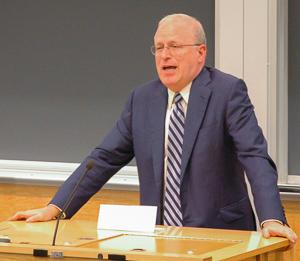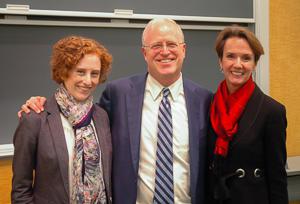How to Close Guantánamo
Former Obama Administration Special Envoy Cliff Sloan Says the "Path Is Clear" to Shut Down the U.S. Detention Facility - and Shows How to Do It - in a Speech at Columbia Law School
New York, November 23, 2015—Emptying the Guantánamo Bay detention facility is within President Barack Obama’s grasp, and he doesn’t need Congress to make it happen, said attorney Cliff Sloan, the former State Department special envoy for closing Guantánamo, in a Nov. 11 speech to students at Columbia Law School.
| Attorney Cliff Sloan, former special envoy for closing Guantánamo, said that the closure of the detention facility is within President Obama's reach. |
Sloan’s talk, titled “Guantánamo: Where We Are and the Path From Here,” was introduced by Professor Sarah Cleveland, co-director of the Law School’s Human Rights Institute, which sponsored the event with the Roger Hertog Program on Law and National Security. “It’s a particularly poignant moment to be discussing this issue,” said Cleveland, the Louis Henkin Professor of Human and Constitutional Rights, who noted the United States Senate’s recent passage of a defense spending bill that renewed the ban on transferring Guantánamo prisoners to the U.S. While the vast majority of detainees have been held without trial, transferring some to American courts and prisons has long been considered a key to shutting the military prison.
“The ban on transfers to the United States is, I believe, unconstitutional,” responded Sloan, who said Article II of the Constitution makes the president “Commander in Chief” of the military, and gives him control over particular tactical decisions. Consequently, he said, it gives the authority to Obama as the Executive, not to Congress, to determine the facilities where military detainees may be held. “Obama should move forward aggressively,” said Sloan. “There is a very clear path for closure of Guantánamo during his presidency.”
When Obama named Sloan as the Guantánamo special envoy in 2013, the administration’s push to close the facility had stalled. “Cliff Sloan reinvigorated the effort,” Cleveland said, though it continued to be dogged by political controversy. By the end of Sloan’s service, however, he had arranged for the transfer of approximately 50 detainees.
The closing of Guantánamo had once looked imminent. During the 2008 presidential campaign, both Obama and John McCain pledged to empty the prison, and on January 22, 2009—his second day in the White House—Obama signed an executive order to shut the facility within a year. Even former President George W. Bush came to agree, calling Guantánamo “a propaganda tool for our enemies and a distraction for our allies.” At the end of the Bush administration, “They were taking steps to close Guantánamo, and they transferred out hundreds of detainees without any kind of Congressional outcry,” said Sloan. “Then, in the first half of 2009, the issue blew up politically. Congress began to pass a number of restrictive pieces of legislation.”
Under this legislation, prisoners could not be transferred to the U.S., and for a time Congress even severely restricted transfers to foreign nations. The restrictions against foreign transfers were eased in late 2013, when Sloan forcefully resumed transfers and oversaw the Obama administration’s six-agency task force to determine whether more detainees could be sent elsewhere. “One of the myths that is out there is that we couldn't get other countries to take these detainees,” Sloan said. “But we got a wide range of countries to step forward.” Since 2013, prisoners have been repatriated to countries such as Afghanistan, Kuwait, Saudi Arabia, and Algeria, and resettled to countries such as Uruguay, Oman, Estonia, Georgia, and Slovakia.
Almost 14 years have passed since the opening of the Guantánamo prison, and over that period nearly 800 men have been held within its walls. “When Obama took office, there were 242 detainees,” said Sloan. “When I began, there were 166 detainees. As of today, there are 112.” Of those 112 detainees, 53 have already been approved for transfer to foreign countries, but “almost 90 percent of them” are from Yemen, Sloan said, where “the security situation is perilous.” The Yemeni detainees are now “stuck with nowhere to go,” but Sloan said that resettlement locations can be found through aggressive efforts by the Obama Administration. Only 10 ten prisoners in Guantánamo face criminal charges in the military commissions that Congress set up in lieu of regular courts, while 49 more currently are “neither approved for transfer nor facing any kind of formal charges.”
| Cliff Sloan, center, with his daughter, Columbia Law School student Sarah Sloan '16, left, and Professor Sarah Cleveland, co-director of the Law School’s Human Rights Institute, right. |
Sloan believes that, “even with the restrictions currently in place,” the Obama administration can “accelerate the pace” of transfers to foreign countries. He noted that the Periodic Review Boards, that were established to determine whether detainees not previously designated for transfer could qualify, have found that 15 of the 18 detainees reviewed could now be transferred. Sloan called on the administration to vigorously accelerate the Periodic Review and transfer process, including by establishing monthly benchmarks for transfers. “Transfer all of those who can be transferred first, and then when you've got the number of detainees down to the very limited number who cannot be transferred to a foreign county, move those to the United States. It will be a very small number at that point, and as the numbers go down, the irrationality of the view that somehow, in our super secure facilities, we couldn't handle them becomes more apparent.”
“There is no one better positioned to talk about where we are and where we can be than Cliff Sloan,” said Cleveland, in her introduction. She detailed Sloan’s extensive history as a litigator, including arguing six cases before the U.S. Supreme Court. He is currently a senior partner at Skadden, Arps, Slate, Meagher & Flom in Washington, D.C. He was a graduate of Harvard Law School, and he clerked for Supreme Court Justice John Paul Stevens. From 2005 to 2008, he was the publisher of Slate. “But perhaps his greatest accomplishment,” Cleveland said, “is being the father of Columbia Law School third-year student Sarah Sloan ’16, who I’ve had the privilege of having as a civil procedure student and teaching assistant.”

